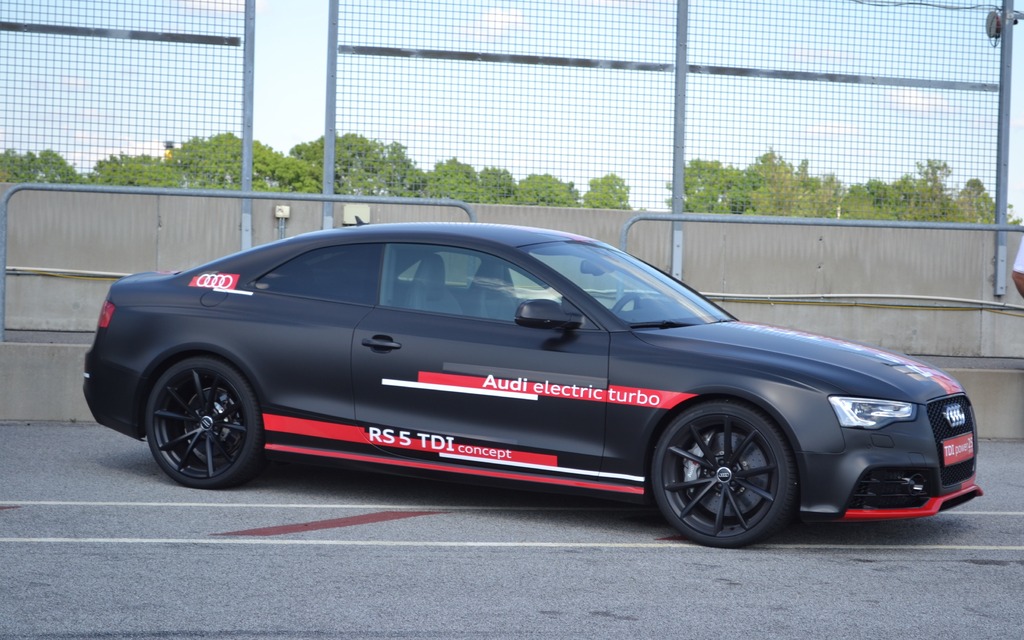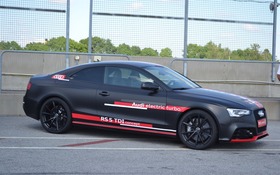Audi RS5/A6 TDI Concept: When Diesel Means Power and Fuel Economy
This year, Audi is celebrating the 25th anniversary of its TDI diesel engine, the first to include a turbocharger and direct injection on a diesel engine. During the 1970s oil crisis, Audi engineers wanted to develop a mill that would be more fuel-efficient so that they could respond to market realities while gaining an edge over the competition.
In 1989, the German automaker unveiled the first TDI at the Frankfurt Auto Show. It was housed in the Audi 100, a car featuring a 2.5-litre turbocharged inline-five that delivered 120 horsepower. Since then, Audi has been fine-tuning its diesel engines, which now have a stronghold on 70% of certain key European markets!
New crisis, new advancements
Periods of crisis often give rise to major advancements, and the ongoing rise in gas prices since 2008 paired with increasingly strict anti-pollution standards have forced manufacturers into action. The race toward fuel efficiency is well underway! Proponents of all-electric technology would like to see combustion engines fade into the past, but in the short term this remains a utopian dream.
In today’s race, each automaker has come up with its own line of new technologies. Some are betting on hybrid vehicles, others electric. But since we know that no single technology is going to dominate in the near future, most automobile manufacturers are hesitant to put all of their eggs into just one basket. As time goes by, different technologies will suit different needs and become an important consideration in the purchase process.
More fuel efficient than a hybrid?
Audi has already incorporated electric power into some of their models, but it’s also keeping pace with other manufacturers by reducing fuel consumption in its conventionally powered vehicles. This involves making various improvements to its combustion engines including reducing friction, controlling temperatures, improving fuel injection and optimizing the use of superchargers. Since diesel engines are already more fuel efficient, the four-ringed brand will be introducing several new TDI drivetrains this year, just to show how advanced they are in this field. Did you know that the Audi A3 Ultra sold in Europe comes with a 1.6-litre TDI that uses just 3.2 litres per 100 kilometres? That’s less than a Chevrolet Volt!
Audi RS5 Concept: V8 power, four-cylinder fuel consumption
In recent years, we’ve seen a downward trend among automakers, who are cutting back on engine displacement and using superchargers to compensate. As a result, performance is unaffected—or even increased—while fuel consumption is reduced. Until now, this solution was only used on gas engines, but now Audi is gearing up to use it on a diesel engine!
As is often the case, new developments for production models are taken from race cars, and that’s exactly what happened here. The new 3.0-litre TDI is directly derived from the R18 TDI race car. It delivers the same amount of power as a V8 but only uses as much gas as a four-cylinder.
What’s unique in this case is that a small supercharger, joined by classic twin turbochargers, is activated by an electric motor and maximizes torque at low speeds instead of relying on exhaust gases to spool up the turbos. In the RS5 Concept, the engine unleashes 385 horsepower and an astonishing 553 lbs.-ft. of torque. Meanwhile, the A6 Concept isn’t far behind with 326 horses and 428 lbs.-ft. (its figures are a little lower as the concept only has a single turbocharger).
We were lucky enough to drive both vehicles equipped with this engine—and we were blown away by the experience. To test their virtues, we took both vehicles out on the track and quickly discovered the sheer power of their acceleration. Diesel and sporty driving may not be a classic combination, but in this case the two go hand-in-hand! Step on the RS5’s accelerator and you’ll be nailed to your seat as maximum torque is attained at 1,250 rpm. This will get you from 0 to 100 kilometres per hour in about four seconds. But where this technology really shows its worth is in passing manoeuvres, which are much more frequent than cold sprints in everyday driving.
To give you a better idea, the car we were following on the track was an Audi RS6 equipped with a 4.0-litre twin-turbo V8 that produces 560 horsepower and 516 lbs.-ft. or torque. During initial acceleration, this car and the A6 Concept were nose to nose, but the RS6 eventually pulled ahead. But if we compare the fuel economy against the performance, we can truly appreciate the TDI’s technological superiority. The only thing we envied in the RS6 was the sound of its engine. As impressive as the diesel engine is, we had to admit that its rumble just wasn’t up to snuff.
We’d be willing to bet that this drivetrain will soon be included under the hoods of Audi’s best sports cars. While it hasn’t been confirmed yet, there’s a good chance it will make its way into the Audi R8!












